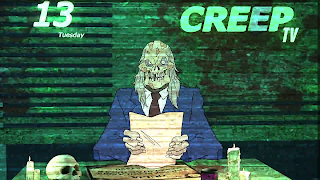Cody looks at the penultimate episode of Creepshow season 3.
I watch every episode of Shudder's Creepshow series with blog contributor Priscilla, and occasionally there will be a segment on the show that she'll say "didn't feel like Creepshow", because to her it didn't fit in with the tone or style of the original Creepshow film or Creepshow 2. She enjoys the show, it just doesn't always match her idea of what Creepshow is. I'm more lenient when it comes to what "feels like Creepshow" to me. Going off the idea that this franchise is meant to be stories from a fictional comic book series, I assume that there would be a wide variety of stories as the comic book run went on. Sometimes the show will go in directions I'm not sure of, but the only thing I outright reject as "not Creepshow" is the movie they tried to sell as Creepshow 3. Still, I have to admit that while watching the Time Out segment of this episode of the Creepshow series, I was thinking "This feels like The Twilight Zone" rather than Creepshow.
Directed by Jeffrey F. January, who directed the The Last Tsuburaya segment of a previous episode, from a script by series newcomers Barrington Smith and Paul Seetachitt, Time Out centers on an armoire that was acquired by an American soldier in Germany back in 1944. He brought the armoire back to the states with him - and then discovered that if you step inside the armoire, time passes differently for you. You can go inside the armoire for hours, then emerge and find that barely any time has passed for the outside world. Decades later, the soldier's grandson Tim (Matthew Barnes) inherits the armoire and discovers its secrets for himself. He uses it to his advantage by doing his schoolwork and business work in there, as its time trickery allows him to accomplish much more than the average person would be able to. But it has an unfortunate side effect...
Time Out is a really interesting story, it just seemed like it would have been more suited for a different anthology series. But here it is in Creepshow, and I enjoyed watching it.
It seems somewhat fitting that my biggest issue with the segment was the way it presented the passage of time. The story opens with comic book panels that show the acquisition of the armoire in 1944, then the words "Present Day" appear on the screen - and in this "Present Day", Tim is a little kid attending his grandfather's funeral. Okay, I took "Present Day" as being 2021 and assumed the grandfather must have been very old. But then we're told that it's "Ten Years Later". Tim is in college, and I thought we were seeing a glimpse into the future. A future that was oddly retro. Then a calendar on the wall revealed that this "future" was actually 2000. That made more sense than 2031, but this confusion could have been avoided if the show had told me the funeral was in 1990, not "Present Day".
In the last 17 minutes of this episode's 45 minutes we get the story The Things in Oakwood's Past, which is entirely animated. Animation has been part of the Creepshow franchise since the beginning, when moments of flipping through a comic book were done through animation. Then the wrap-around story in Creepshow 2 was animated, and last year Shudder released an animated Creepshow special. So this wasn't out of place - and when I saw that a segment was going to be animated, I figured that it would contain something that would have been too expensive to bring to the screen in live action. The show tends to use comic book panels to not only establish and end the stories, but also to cut costs along the way, so it can be assumed that it would fully animate a segment for that same reason. The animated special came about due to the pandemic, but also allowed them to adapt the Stephen King story Survivor Type, which they had found too costly to bring to the screen due to the island location it required.
Things in Oakwood's Past does indeed feature locations, crowd scenes, and action that probably would have been too difficult for this show to accomplish in live action. Written by the show's creative supervisor Greg Nicotero and author Daniel Kraus, who recently completed George A. Romero's unfinished novel The Living Dead, the story is set in Oakwood, Maine and is packed - as fans have come to expect from Nicotero - with references to the works of Romero and Stephen King. The set-up tells us that every resident of Oakwood vanished in 1821, and now some artifacts from that year have been located... and in the end, that causes some more trouble for the town.
Directed by Nicotero and Dave Newberg, who also worked on the animated special, this was a quick and fun segment, and it had the added bonus of featuring the voices of Ron Livingston, the legendary Mark Hamill, and genre icon Danielle Harris. The bloodshed didn't hurt, either.








No comments:
Post a Comment